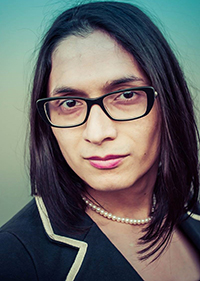Katherine Cross is a Ph.D. candidate at the Information School whose research focuses primarily on the dynamics of online harassment, particularly on social media. Anna Lauren Hoffmann is an iSchool associate professor who researches the ethical challenges and risks of technologies, and much of her work has focused on Facebook. We spoke to them Nov. 9 about the upheaval at Twitter since Elon Musk took over the company in late October.
Q: Twitter recently cut half its workforce, including its human rights, accessibility, ethical AI, communications, curation, and public policy teams. What good do these teams do and what is Twitter losing?

Hoffmann: It's also worth noting that Meta and other tech companies are going through layoffs, too. I know social science researchers have been impacted elsewhere. So there is something to be said about how much of this is easy to think of as a Twitter problem because of Elon Musk and the bombast by which he does anything, and how much of it is indicative of the broader trend.
Cross: There's a growing mythology amongst a lot of venture capitalists that all tech companies are dramatically overstaffed, and I think that this is in part a backlash against the fact that many of these companies have started hiring researchers and ethicists, and a backlash against labor organizing at these companies. I think that they are being treated as a “nice to have” rather than a must-have. But their work is actually essential for pointing out how the technology is actually going to be used, predicting in a reasonable fashion what the unintended consequences of any product launches might be, and for helping to ensure the trust and reliability that is increasingly a bedrock of a lot of these companies’ business models.
One of the issues that's arisen certainly with Twitter is that now, by getting rid of a lot of these people who had been sort of like crewing the dikes, keeping back a lot of the very worst of the Internet, that it's making the site less stable, less reliable, less predictable, less safe for advertisers and also for, in particular, the people whose very celebrity acts as a value-add to the platform. If you are a figure like Beyonce or a major political leader or a famous athlete or actor, you just being there brings people to the site. Those people might stop becoming more hesitant if impersonating them becomes easier, and if their tweets are likely to appear next to Nazi propaganda and things like that.
Q: Will users in general see anything noticeably different?

Cross: Bearing in mind that this is just a prediction, we can expect the platform to get worse than it already is, for there to be more harassment, more abuse on the platform. There will be more tolerance for disinformation. I think that, more broadly speaking, the absence of a lot of these teams means that Twitter will become even more dangerous and less reliable outside of the West, or the English language. People [globally] have been less keen to initiate an exodus from the platform because they need it for organizing and getting the message out. But I think their needs are going to be very poorly served by this new regime.
Hoffmann: It's a lesson we learn over and over again. Anytime there are major design changes, feature changes and upgrades, it's always the most precarious and at-risk users who take the brunt of that. Because of this move, there are going to be people who feel that precarity who have not been made to feel it before. Many others who depend on Twitter — for professional networks, for their livelihoods, for other things — who have largely escaped [the brunt of] design changes or other policy changes or actively benefited from them now might stand to lose in a way that a certain set of users have always lost when those things happen. People with a certain prestige and position are now the ones who are worried.
Q: How will the changes at Twitter make things worse for vulnerable populations?
Cross: The site has always been bad for marginalized people. To the extent that it has had benefits, those benefits are real in terms of bringing people together that would not otherwise be able to meet. But this has come at such an enormous cost that I think it is still debatable whether it was worth it. That's the pre-Musk Twitter, by the way; it could only get catastrophically worse, and there are two reasons for this. One is because of harassment campaigns by bigots and by extremists who are opposed to the existence of certain groups of marginalized people, but also because Twitter has been extraordinarily good at stirring up internecine warfare amongst marginalized people in ways that have been extraordinarily destructive.
Hoffmann: The potential silver lining here is that, in some ways, those who are the most vulnerable, and who have dealt with the brunt of change over and over again, are oftentimes the most adept at adopting new platforms and other tools. [After you’ve been burned], you sort of build more diverse communication networks. I think you're going to have some people who suddenly have to explore new platforms because they're now spurred to be uncomfortable.
Maybe there's more to your digital communication portfolio than Twitter, Slack and whatever email client your employer locks you into. That'll be interesting in many ways. In the last five to eight years, what we think of as social media has been monopolized by a few companies that have come to stand in for the whole of digital platforms, but that’s sort of the anomaly, right? That just wasn't the case from, say, 1993 to 2013. Things came and went. You learned new platforms all the time. You migrated, you moved. I think what we're seeing is probably more in line with the longer history of online platforms and digital communication.
Q: Extremist groups use these platforms to connect with one another and propel their agendas. If Twitter implodes, will it make it more difficult for them to operate?
Cross: Generally speaking, they like to use a sort of constellation of platforms but there will be some kind of home base that is usually a forum. Facebook has proven to be very good for this. This is why Facebook is such a huge problem here, because you can have a Facebook group that operates a bit like a classic web forum. There are all sorts of these home bases or subreddits for people who want to get together to do harm in this way that will act as sort of their base of operations, and then they will filter out into other platforms where they can then harass the normies or recruit.
Twitter has been extremely good for far-right organizing precisely because it is this “everyone, everywhere, all at once” type of platform that is injecting straight into your eyeballs the stream of consciousness of thousands and thousands of people at once. If you can get into that stream, that allows you to either spread your propaganda effectively and recruit people, or harass the people that you want to harass. So that's always been part of the problem with extremists having access to the place. If you rob them of Twitter, that doesn't eliminate the problem, but it does sort of strangle off a pretty potent means of communication for a lot of them, although usually it's more effective to break up their bases.
Hoffmann: I think one thing that Katherine is pointing to is that the way certain messages can travel on Twitter is distinct from the way that they can travel on other platforms. Twitter has gotten an inordinate amount of attention and scrutiny because of the amount of eyeballs that are fixed on it, especially in the media, especially amongst journalists, especially amongst commentators, and especially amongst academics. Certain messages become a part of a national conversation, purely because of the degree to which eyeballs are fixed on Twitter.
Cross: Anna is absolutely right. Twitter occupies a unique position in a lot of public discussions because it's where a lot of people who I would loosely term epistemic elites end up congregating. They imbue it with a great deal of importance; I think we've all read news articles that are half made up of tweets. What gets tweeted by any number of relatively prominent personages is treated as a profound insight, and it's the place to be for a lot of journalists, a lot of academics, politicians, celebrities, artists, and writers. The fact that Twitter has become an unofficial job requirement in academia, journalism and many other professions I think has been extraordinarily destructive. Twitter has great ability to do harm, and that is magnified by so many people in power taking it way too seriously.
Q: Should people or businesses or universities that are concerned about ethics still be on Twitter and Facebook?
Cross: I wrote a Wired column about this recently; as I wrote, the harm-reduction approach is that epistemic elites should spend less time on the platform, at the very least. And to, as I said, stop making it a job requirement. I think that using Twitter as a source for a lot of news stories is a practice that needs to stop, or at least be seriously abated because there’s a vicious cycle with that. Newsrooms are being defunded and making it harder for journalists to do gumshoe work out in the physical world, and instead telling them all to go to Twitter to get the story.
Hoffmann: I think in the context of academia, it has served to harm some job seekers and future scholars, but I also think that there are counterexamples where people who would normally be locked out of expensive conferences, travel and other sorts of venues are actually able to build networks and communicate. I would be more reluctant to moralize the effects. But I will say that insofar as it has been harmful or helpful to different people, it has been against a broader backdrop of precarity and vulnerability that informs people’s decisions, like having to engage or not engage on a platform like Twitter.
Cross: There's been plenty of good that the platform is done for a lot of people. I have become extremely dubious about whether it's been worth the cost, because the cost has been extraordinary.